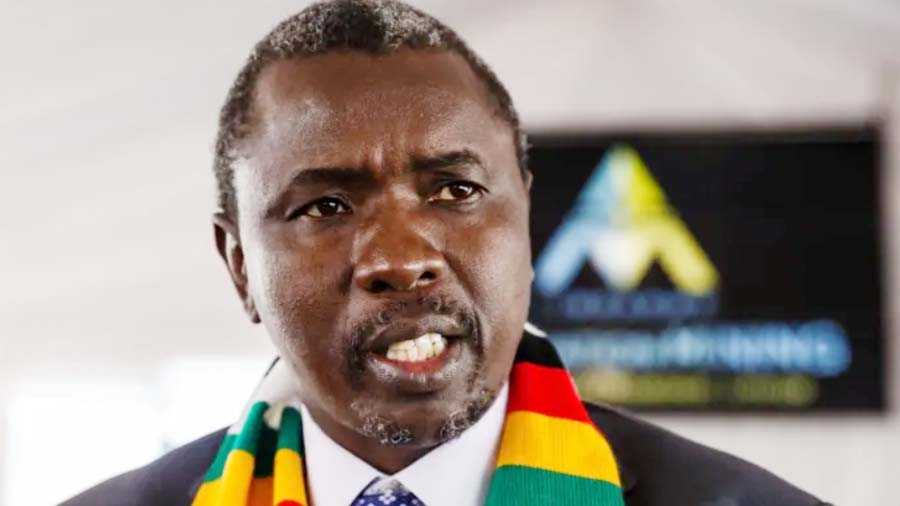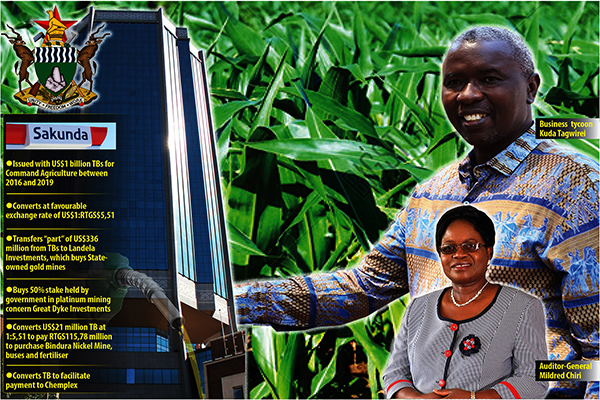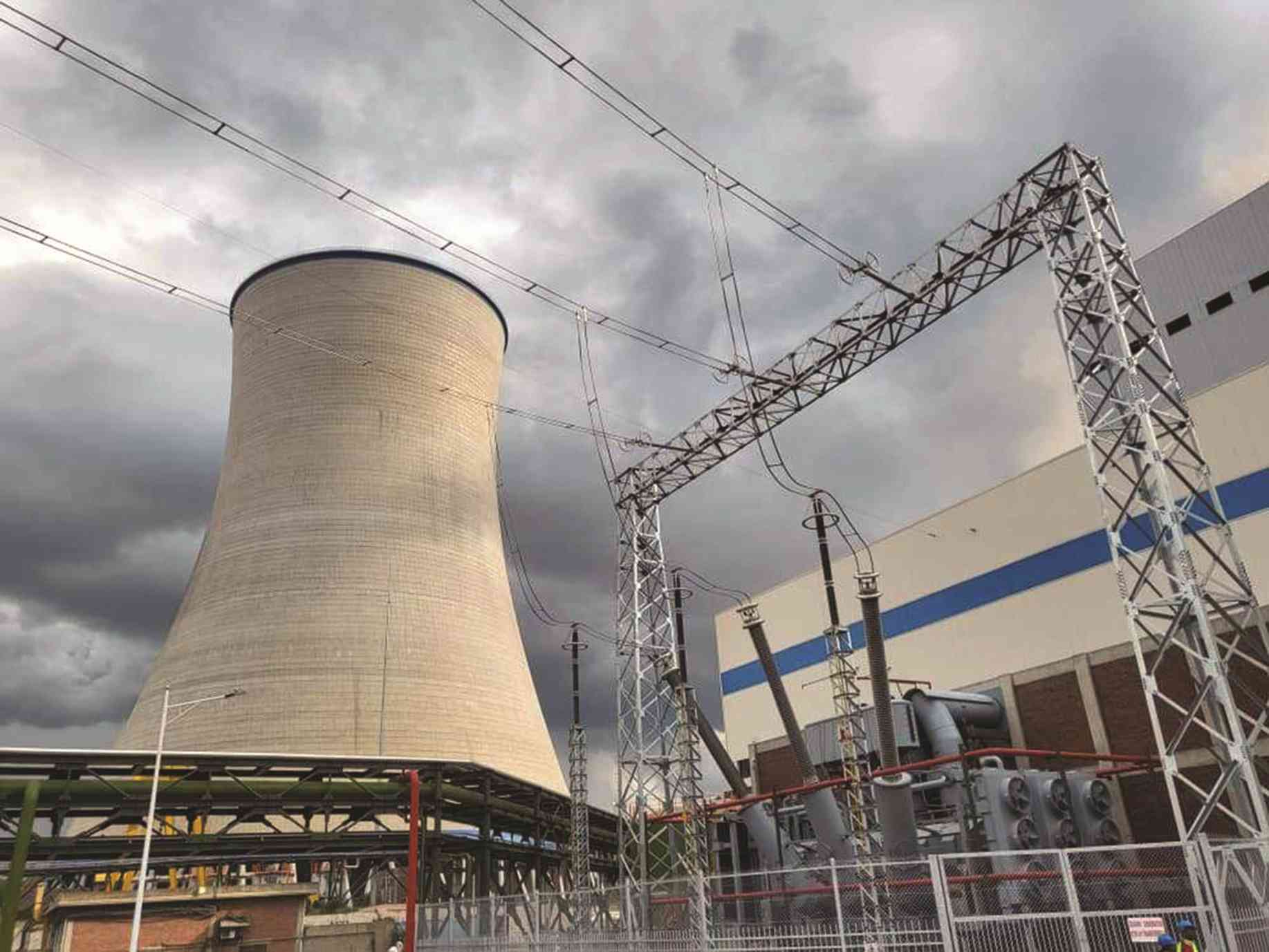
TINASHE KAIRIZA SAKUNDA Holdings, linked to businessman Kudakwashe Tagwirei, redeemed Treasury Bills (TBs) it held under the US$1 billion Command Agriculture programme at a favourable exchange rate approved by the central bank, while 67% funds of the facility were not recovered by 2018.

The explosive revelations are carried in a forthcoming investigative report, first made available by The Sentry to the Zimbabwe Independent.
The report titled Legal Tender? The role of Sakunda and the Reserve Bank of Zimbabwe (RBZ) in Command Agriculture casts light on how Sakunda was cherry picked to run the multi-billion-dollar programme outside public tendering regulations.
The report questions the selection process of over 30 input suppliers by the entity and how it redeemed TBs running into millions of United States (US) dollars with approval from the RBZ at a preferential exchange rate allegedly in violation of the country’s laws.
The Sentry is an investigative and policy organisation that seeks to disable multinational predatory networks that benefit from violent conflict, repression, and kleptocracy.
The opaqueness surrounding Command Agriculture has been a subject of intense scrutiny by the Parliamentary Public Accounts Committee (Pac) and Auditor General Mildred Chiri, who pointed out in her 2018 report that the programme was replete with gross irregularities.
As pointed out in The Sentry report, Sakunda was issued with TBs amounting to US$1 billion outside United States dollar (USD) cash payments received during the period that the company rolled out Command Agriculture between 2016 and 2019.
- Chamisa under fire over US$120K donation
- Mavhunga puts DeMbare into Chibuku quarterfinals
- Pension funds bet on Cabora Bassa oilfields
- Councils defy govt fire tender directive
Keep Reading
In 2019, the time Sakunda converted some of its TBs at a favourable exchange rate, Zimbabwe had introduced Statutory Instrument (SI) 33, which pegged the exchange rate at US$1:RTGS$1.
However, while other USD denominated accounts were converted to the equivalent value of local currency, Sakunda and Landela Investments, as revealed by the report, cashed in on the TBs at a favourable rate approved by RBZ, thereby making extra cash in the process.
In one such transaction involving US$336 million Treasury Bill (TB), the report highlights Sakunda transferred “part” of it to Landela, which proceeded to buy state-owned gold mines and a 50% stake held by the government in platinum mining concern Great Dyke Investments (GDI).
The report reads: “Part of the US$366 million Treasury Bill that Sakunda received in January 2019 was transferred to another company”, Landela Investments.
“The Treasury Bill was converted into local currency at a favourable rate by the RBZ, giving Landela the equivalent of US$50 million that was then used to purchase gold and platinum mines owned by the government and military.
“According to Sakunda, the January 2019 US$366 million Treasury Bill (ZTB 365 20190109B) was split: “US$256 million went to a specific bank” and US$100 million relating to the same instrument …went to a different bank”.
However, Sakunda, in its responses to The Sentry seen by the Independent, denies any wrongdoing relating to receiving preferential treatment from RBZ and contributing to the local currency losing value.
Sakunda also denied any association with Landela Investments.
“As we have stated, Sakunda and Landela, called by whatever name, are not related, and we, therefore, refrain from commenting on matters to which we are not privy,” Sakunda Holdings company secretary Maurice Makoni said.
Sakunda told The Sentry that although an open tendering method was not used by the government in 2016, it was appointed as part of a competitive process, having put forward the most attractive proposal.
The company noted that it was appointed in terms of a “Cabinet Authority”, which according to the company is the overriding instrument in terms of the country’s public procurement protocols.
“In June 2019, Landela Investments asked its bank to transfer a US$60 million portion of the same Treasury Bill (ZTB 365 20190109B) to the RBZ, in turn requesting that the RBZ pay local Zimbabwean dollars…for the purchase of mining companies, buses and fertiliser. It is unclear how the Treasury Bill was transferred from Sakunda to Landela,” the report reads.
In two separate letters written on June 6, 2019, Landela director Chris Fourie requested from the BancABC Clients Relationship manager to transfer Treasury Bills worth US$21 million and US$39 720 685,59 to an RBZ Central Securities Depository (CSD) Account.
This publication saw Fourie’s letters.
Prior to that, Fourie on June 4, 2019 had written two letters to RBZ governor John Mangudya, firstly requesting the apex bank to liquidate Treasury Bills worth US$39 720 685,59 at an exchange rate of US$1:RTGS$5,5135 which was the prevailing interbank rate to facilitate payments of RTGS$219 million to GDI and Chemplex.
In the another letter to Mangudya, Fourie additionally requested the conversion of Treasury Bills worth US$21 million at that day’s interbank rate of US$1: RTGS$5,5135 to process a payment of RTGS$115 783 500,00 for the purchase of Bindura Nickel Mine (BNC), buses and fertiliser.
Essentially, The Sentry report states that the transaction was “problematic” for two reasons being: the “…companies were using Treasury Bills intended as security for Command Agriculture for other purposes including buying mining companies held by the government”.
RBZ also appeared to have given “Sakunda and Landela a preferential rate when converting the US dollar denominated Treasury Bill into local Zimbabwean currency.”
Responding on whether Sakunda received preferential treatment from RBZ, Makoni wrote to The Sentry: “This allegation is simply false, and part of a coordinated character assassination intended to discredit our organisation, of which your organisation is a knowing participant. There was never a time Sakunda was favoured with preferential treatment by the RBZ.
“It must be noted that (SI) 33 of February 2019 did not summarily convert corporate USD balances to the Zimbabwe dollar at the rate of 1:1.
“The net effect of SI 33 was that the government assumed all proven external legacy debts by quarantining them into blocked funds, and they came to an amount in excess of US$3 billion on the basis of 1:1 principle,” Sakunda said in its responses.
“Since then, local companies chose different instruments and structures to liquidate their blocked funds using financial institutions of their choice at USD auction rate of the day. This was neither exclusive nor a favour to Sakunda but a government position which benefited more than 600 companies.
“These funds were traded as United States dollars at the ruling exchange rate of the day. I refer you to the Finance Bill HB 16, 2021, as ratified by parliament, seeking to rationalise this framework,” Sakunda said.
However, The Sentry insists that the conversion of all assets and liabilities valued in US dollars into the local currency at an equivalent rate of 1:1 as stipulated by the legal instrument was not applied to Sakunda.
“However, as revealed by the organised Crime and Corruption Reporting Project (OCCRP), this change did not affect Tagwirei’s January 2019 U$366 million Treasury Bill. Portions of the Treasury Bill were redeemed at a favourable rate by the RBZ after SI33 came into force on February 22, 2019,” the Sentryreport reads.
Mangudya told the Independent this week that it was in the purview of the Treasury to decide how TBs are redeemed.
“Treasury Bills are the prerogative of the government through the Ministry of Finance who are the issuers. The Reserve Bank does not therefore issue Treasury Bills and bonds but provides custody of government securities through the Central Securities Depository (CSD) as the banker of the State,” Mangudya.
“The response to your enquiry is that the said Treasury Bill was handled in line with terms of the referenced Treasury Bill.”
A top Treasury source said the RBZ’s role in the conversion of TBs is that of an agent of government, through the Ministry of Finance.
The soon-to-be published report highlights that Command Agriculture was highly politicised while it became a feeding trough for the elite and politically connected.
The Sentry estimates that at least 67% of Command Agriculture expenditure was not recovered.
“Many farmers did not repay their loans. The IMF estimated that 35% defaulted, while the World Bank and the government of Zimbabwe estimated that, in 2018, two thirds of Command Agriculture expenditure was not recovered,” the report reads.
In the report, The Sentryproffered a range of recommendations to authorities, including financial institutions, “to conduct enhanced customer due diligence on transactions involving natural resources in Zimbabwe — especially when transactions involve the Tagwirei network”.
Justyna Gudzowska, Director of Illicit Finance Policy at The Sentry, told the Independent: “The central bank’s granting of a seemingly favourable exchange rate to an oil tycoon to pay a Zimbabwean military company for Zimbabwean-Russian platinum mine doesn’t pass the smell test.
It’s time for the Zimbabwe Anti-Corruption Commission and police to investigate properly”.
In addition, Oliver Windridge, Senior Advisor at The Sentry, said: “The US$1 billion Command Agriculture programme was the product of a behind-closed-doors culture.
Part of the solution is to embrace open contracting — making all contracts and payments public.










